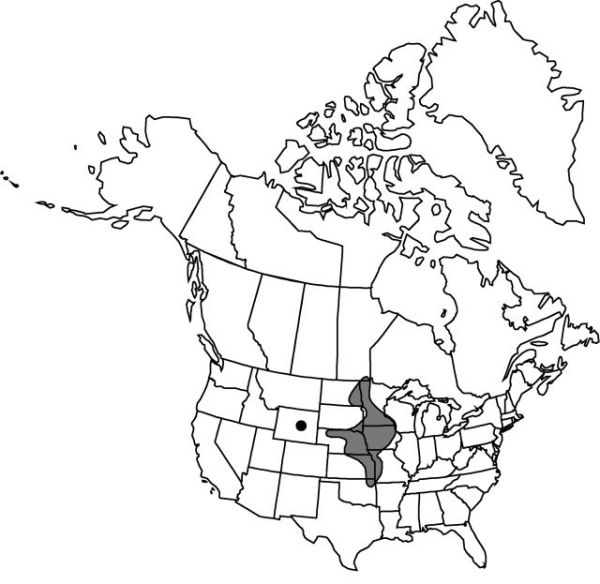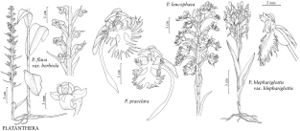Platanthera praeclara
Rhodora 88: 278, figs. 1a–d, 2–4. 1986.
Plants 38–85 cm. Leaves several to many, ascending, scattered along stem, imperceptibly reduced to bracts distally; blade lanceolate to ovatelanceolate, to 26 × 5 cm. Spikes lax. Flowers resupinate, showy, creamy white; lateral sepals somewhat porrect; petals flabellate, truncate, sometimes emarginate, apically lacerate; lip descending, deeply 3-lobed, without basal thickening, 17–32 × 20–39 mm, distal margins of lobes deeply incised and fringed, lateral lobes flabellate, sometimes broadly and overlapping middle lobe, middle lobe flabellate, sometimes very broadly, emarginate; spur slenderly clavate, 36–55 mm; rostellum lobes directed strongly forward, widespreading, angular; pollinaria geniculate; pollinia directed forward (column appearing hooded), remaining enclosed in anther sacs; viscidia orbiculate; ovary slender, mostly 20–30 mm. 2n = 42.
Phenology: Flowering (May–)Jun–Aug.
Habitat: Mesic to wet prairies
Elevation: 200–800(–1600 m)
Distribution

Man., Iowa, Kans., Minn., Mo., Nebr., N.Dak., Okla., S.Dak., Wyo.
Discussion
Of conservation concern.
In Platanthera praeclara the wide-spreading rostellum lobes separate the viscidia by 6–7.5 mm, whereas in P. leucophaea the short rostellum lobes are more nearly parallel, and the viscidia are separated only by about 1–3.5 mm. These differences are immediately obvious on living material, but the measurements are nearly always impossible in herbarium specimens.
In Wyoming Platanthera praeclara is known from a single, much higher station outside the usual range.
Selected References
None.
